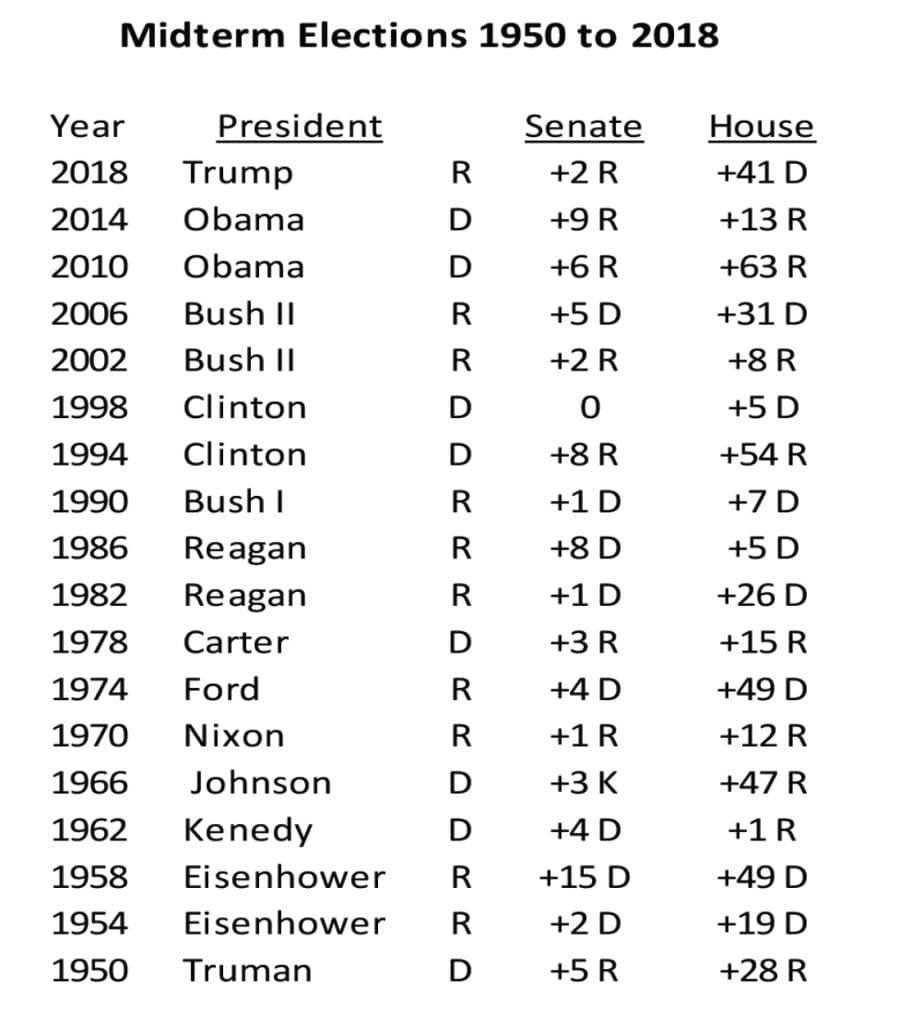Many political pundits were predicting that the midterm elections would produce a wave of Republican victories — some even predicted a “Red Tsunami” — in which Trump-endorsed candidates would take control of the both the House and the Senate.
But instead of a “red wave,” it now appears that the Democrats have retained control of the Senate. The House will be very close. What happened?
Midterm elections when the presidency is not on the ballot are notoriously harsh on the political party of the president. The table on the right shows the outcomes of the 16 midterm elections since 1950.

One theory for why midterm elections are so harsh on the president’s party is that when a popular president is on the ballot there is a “coattail effect” that carries other candidates to victory.
But when the president is not on the ballot, there is no coattail effect. But this is not a very viable explanation for the 2022 result because Biden had no coattails in 2020 as the Democrats lost 10 seats in the House.
Another explanation that has been offered is the larger the presidential victory margin, the more seats in Congress are won by the president’s party, and the more seats will be at risk in the midterm election. But this is not likely to explain the “missing red wave” because Biden’s victory margin was a relatively small 9 percent.
A third explanation making the rounds is that voters under 30 turned out to vote in record numbers in the 2022 election.
These young voters tend to favor Democrats over Republicans by a two-to-one margin, and they are more motivated by issues such as abortion rights, gun control laws, student loan forgiveness and climate change than by ideology.
The theory I favor is that the country is politically polarized, with 29 percent of the voters registered as Republican, 29 percent registered as independent, and 39 percent registered as Democrat.
Thus, Republicans need to attract about 80 percent of the independent voters to win in the general election.
Many of the candidates Trump endorsed were in “safe” seats they were expected to win. But among those candidates in competitive races, his endorsement failed to draw enough independent and Democrat voters to win and may have motivated those opposed to Trump to go to the polls and vote.
Trump is facing a myriad of legal woes that he has been trying to drag out with judicial appeals and other legal tactics, perhaps in the hope that when Republicans regained control of the House and the Senate, they would squelch some of the investigations and proceedings. But now that is not likely to happen.
Regardless of the reason, the traditional midterm wave against the president’s party did not materialize and Donald Trump now has some difficult decisions to make, some of which could affect the future of the Republican Party as well as the entire country.
Trump is scheduled to announce his candidacy for president in the 2024 election on Nov. 15. (I am writing this on November 13, so readers will know some of these answers whereas I do not.)
1. Can he win the Republican nomination if he decides to run? There is a lot of talk among republicans since the midterm election about other presidential candidates such as Ron DeSantis and Glenn Youngkin who may have similar policy appeal without Trump’s baggage.
2. If he cannot get the Republican nomination, would he run as a third-party candidate? With three candidates he might stand a better chance to get the 270 votes in the electoral college necessary to win the presidency.
3. Can he fight his legal battles and run for president at the same time? (Eugene Debs received nearly a million votes in 1920 as the Socialist Party candidate while imprisoned in the Atlanta Federal Penitentiary for speaking out against the draft during World War I.)
4. What does he hope to achieve if elected president? Many Americans are growing weary of our political polarization and are looking for candidates who can unite the country to deal with growing international conflicts and crises. Would he be able to expand his appeal beyond his base?
Trump may have given us a clue by violating Ronald Reagan’s 11th Commandment: “Thou shall not speak ill of a fellow republican” by attacking Ron DeSantis, Glenn Youngkin, and other party leaders who have not toed his line.















Comments are closed.